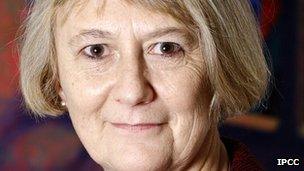IPCC receives 631 corruption allegation complaints about Welsh police forces
- Published

IPCC chair Dame Anne Owers: 'corruption is not widespread'
A report by the police watchdog shows Dyfed-Powys Police topped a list with corruption allegations made against it for the size of its force.
Gwent and North Wales Police also made it into the top five entries in the table produced by the Independent Police Complaints Commission (IPCC).
It wants clearer information on what constitutes police corruption with 631 complaints in Wales over three years.
Dyfed-Powys and Gwent forces said they noted the findings of the report.
The other forces have been asked to comment.
A spokesman for Dyfed-Powys said it noted that in 90% of the cases referred to the IPCC, the matters involved issues of improper disclosure of evidence, irregularity in evidence, or other irregularity in procedure.
<link> <caption>The IPCC report</caption> <url href="http://www.ipcc.gov.uk/news/Pages/pr_240512_corruptionreport.aspx" platform="highweb"/> </link> into forces in England and Wales over a three year period was commissioned by the Home Secretary Theresa May.
It said there were 631 allegations of corruption made against Welsh forces between 2008 and 2011.
In its investigation, the watchdog sets out to examine public perceptions of police corruption and to what extent any corruption exists.
In her forward to the report, the IPCC chair, Dame Anne Owers stated: "The overriding message that comes out of this report is that corruption is not widespread, or considered to be widespread.
"But that where it exists it is corrosive of the public trust that is at the heart of policing by consent."
Analysis of complaints made against the police in Wales and England showed that between 2008 and 2011, a total of 8,542 allegations of corruption were made by the public.
In the Dyfed-Powys force area there were 146 allegations against officers.
With just 2,100 police officers, that gave the force a ratio of 69 complaints per 1,000 officers - the highest in Wales and England.
The average rate of complaint stands at 33 per 1,000 officers.
For Gwent Police, with a force size of 2,600, the number of complaints hit 53 per 1,000 officers with 137 allegations.
In north Wales, the ratio was 51 complaints per 1,000 officers with 142 allegations.
The figure for South Wales Police was 206 allegations with 38 complaints per 1,000 officers.
However, of all complaints made to police forces across Wales and England just 837 were considered serious enough to be referred to the IPCC.
In the Dyfed-Powys force, of the 146 complaints made, only 16 found their way to the watchdog.
For Gwent and North Wales Police, seven complaints were investigated by the IPCC.
In south Wales, 40 complaints were taken to the watchdog.
Responding to the findings, a Dyfed-Powys Police spokesperson said: "Dyfed-Powys Police notes and welcomes the report's findings which will inform future practice locally.
"The force acts proactively to prevent corruption and where it is alleged investigates such cases thoroughly and professionally.
"We are currently reviewing our policies and procedures in line with national recommendations following various reviews into this subject area."
The force also noted that in 90% of the cases referred to the IPCC, the matters involved issues of improper disclosure of evidence, irregularity in evidence, or other irregularity in procedure.
"Which not always, on consideration of the circumstances would arguably amount to what the public would perceive as corruption," added the Dyfed-Powys spokesperson.
That point was also raised by the IPCC in its report, concluding that there is "the need for clearer information for the public on what constitutes police corruption".
It goes on to say: "The IPCC will produce a regular analysis of corruption cases it has dealt with, identifying the emerging themes."
A spokesperson for Gwent Police said the force "endeavours to provide the best possible service to the public".
The spokesperson added: "In the case of allegations of corruption, the nature and seriousness of the allegation will dictate whether it meets the criteria for an IPCC referral which is set out in legislation and national guidance.
"Irrespective of whether there is a mandatory referral to the IPCC, all allegations are investigated efficiently and impartially by our professional standards department."
Both North Wales and South Wales police forces have been asked to comment.
- Published26 April 2012
- Published24 February 2012